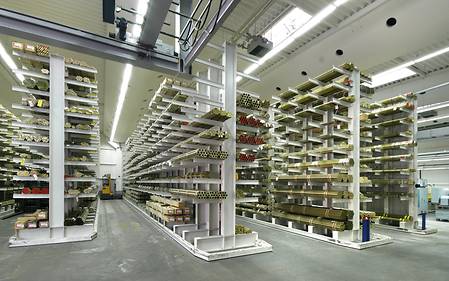SPRINT 50 for more flexible productivity
For several months now three new SPRINT 50 automatic lathes have been fortifying the range of services at Flühs Drehtechnik GmbH in the areas of system technology and precision-part manufacture
Flühs Drehtechnik GmbH has been active consistently and exclusively in the fittings sector since 1926. And for the entire 88 years from its site in Lüdenscheid. Initially it operated solely as a toll manufacturer of precision turned parts made of brass, but gradually moved into complete machining and later even started with the development of complete modules and systems. With around 450 employees Flühs today ranks as a leader in all its fields of activity – and with its system developments even as a quality trademark in the international sanitary industry.
Metal cutting always was, is and will always remain the basis of the success of Flühs Drehtechnik GmbH in Lüdenscheid. Every day Flühs machines around 75 tons of brass to produce over a million turned parts. There are countless multi-spindle machines in the production halls used in three-shift operation to accomplish its high-volume business. These are supplemented by any number of single and double-spindle production turning centres used for more flexible manufacturing orders with volumes ranging from between 10,000 and 20,000 parts. And this is exactly where the three SPRINT 50 machines from DMG MORI have been in operation since the end of last year – each in the version with a main and counter-spindle, TWIN concept, two turrets each with 12 driven tool stations and the TRIFIX tool clamping system plus two Y-axes for optimising milling options.
One of the key arguments mentioned at Flühs for investing in the SPRINTs is first and foremost the TWIN concept with the cross stroke of the counter-spindle / tailstock combination. After all, this version offers virtually two separate work areas on the main and counter-spindle, which enables collision-free parallel machining even of longer workpieces. Another machining alternative offered by the SPRINT 50 is 4-axis machining using the top and bottom turrets which, claim the people in Lüdenscheid, in interaction with the two Y-axes enables a multitude of complex turn/mill operations.
The stability of the machine is another important aspect. Where Flühs was previously limited to the use of smaller tools with their correspondingly longer processing times, wide sectional steels can now be used with the SPRINT 50 thus giving productivity an extra boost.
An attribute which of course applies equally to the TRIFIX quick change tool holders of the two turrets as these come as standard equipment with the SPRINT 50, they allow tools to be clamped with maximum precision and a repeat accuracy of just a few µm. So the time-consuming procedure of re-adjusting every tool, i.e. having to measure the tool holders with a dial gauge every time and optimising them where necessary, is now a thing of the past for many standard operations thanks to TRIFIX.
Where the demand for precision machining is concerned, here, too, the three SPRINT 50 machines fulfil all expectations, one reason, of course, being their already mentioned stability. In addition the processes benefit from the optimised thermal management of the machines. Both the motor and the spindles are cooled keeping thermally-induced changes to a minimum.
In view of the above-mentioned features, functions and machining results, it is little wonder that the three new SPRINT 50 machines received positive acclaim after their first few months in operation. The more so as Flühs claims the question of flexibility will be given higher priority in the long term, particularly where toll manufacturing is concerned. Because even in the sanitary fittings sector the trend towards individuality is on the rise, with the result that more diversity is being called for and batch sizes are on the decline.




